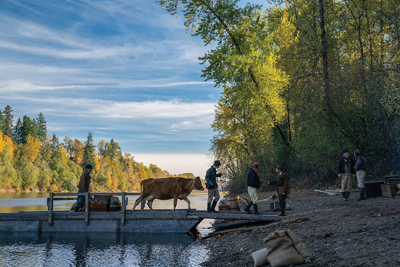
For so many of us, both indie theaters like the Belcourt and corporate megaplex chains like Regal and AMC have long offered an essential means of escape. Whether you’re a Criterion-fixated cinephile, an MCU apologist, a horror nut, a documentary obsessive or some combination thereof, you know that feeling — the feeling of the lights coming down in the theater, when excitement and anticipation wash over you, just the same as they did when you were 6 years old.
The last film I saw in the theater was First Cow, Kelly Reichardt’s tale of hardscrabble frontier life in the 19th-century Pacific Northwest. It was a press screening at the Belcourt Theater one morning back in mid-March — Friday the 13th, to be exact. It was just eight days after the first case of COVID-19 had been confirmed in Tennessee, and though things remained uncertain, we all knew more cases were coming.
First Cow was set for an early-April release. But just two days after that press screening — which was attended by a dozen or so critics, bloggers and theater staff — the Belcourt announced that it would be temporarily closing, doing its part to slow the spread of the novel coronavirus. Not long after, A24 Films — the production and distribution company behind such critical darlings as Lady Bird, The Last Black Man in San Francisco and Uncut Gems — announced the indefinite postponement of First Cow’s release.
I don’t have to tell you that since then, it’s been a ceaseless barrage of deeply shitty news. I know I’m not alone when I say it’s been difficult withstanding these past four pandemic-besieged months without the respite of the movie theater. I want to recommend that you see Reichardt’s excellent First Cow. (And indeed, I do recommend it! Please see it!) It’s a tender, moving, painful depiction of friendship and classism and privilege and trust, and a film worth seeing in the theater. But for now, you’ll have to settle for watching it at home.
Starring John Magaro as frontier cook Cookie Figowitz and Orion Lee as Chinese immigrant King Lu, First Cow does once again what Reichardt has proven to do so well with films like 2008’s Wendy and Lucy and 2011’s Meek’s Cutoff — it shows us the remarkable resilience of the underdog, and both the cruelty and the kindness that humans are capable of. As my late, great predecessor Jim Ridley put it in his review of Meek’s Cutoff, Reichardt strips away pageantry and empty gestures. Her films are about survival.
With its beautiful score by Nashville’s native son William Tyler, First Cow follows Cookie and King as they hit upon a successful recipe for so-called oily cakes. Though simple, the deep-fried dough is a more rich and decadent treat than is often seen by the fur trappers of the Pacific Northwest. Cookie and King sell out of each batch as quickly as they can make them. The rub? The only way to make these oily cakes is by stealing the milk of the only cow in the territory, which is the property of wealthy landowner Chief Factor, played with impossible detestability by longtime character actor Toby Jones. Cookie and King are one another’s entire world, and these cakes offer them a real shot at the American Dream, or at least a life worth living. Their friendship is earnest and wholesome, in part the product of necessity. But their bond is also natural — these two outcasts seem to truly enjoy each other’s company.
“Men like us, Cookie, we have to make our own way,” says King, the more industrious of the two. Indeed, life is tougher for the more sensitive among us — for the downtrodden and the abused. Things are especially difficult in this part of the world where, as King puts it, history has not yet arrived. The scale of First Cow is small. The stakes, too, are small — until suddenly they aren’t. First Cow is gripping and beautiful and very deeply sad. It’s likely the best new film I’ve seen this year.
I’d love to send you to see it at the Belcourt, where you could truly enjoy cinematographer Christopher Blauvelt’s intimate lensing, and find yourself immersed in Tyler’s grand score. Since I can’t do that, I’ll recommend that you throw it in your at-home queue. Given the seemingly endless supply of films to stream, I understand if a slow, sad movie about survival during frontier times isn’t near the top of your quarantine list. But if you’re able to lend it your full attention, to give yourself over to it, perhaps you’ll feel a fraction of what it’s like to be in the theater once again.





